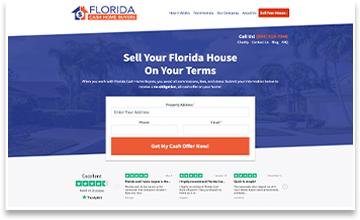Selling a house as-is means what it sounds like — you sell your house in its current condition. By law, there’s some information you need to disclose about the property to the buyer, but you otherwise aren’t responsible for repairs or upgrades.
This is much different from a standard real estate transaction, where a buyer can submit a notice of repairs after inspection asking the seller to fix general repair items. Under these circumstances, sellers must comply, up to a certain repair limit stipulated in the contract.
There are many reasons you might be considering selling as-is. For example, you don’t have the time or money to make costly repairs or renovations, you inherited a home or you need to sell quickly.
No matter what your situation is, we’re here to help you make the best decision. If you need to sell your home fast, working with a cash buyer like us could be a quick and easy process.
This post explains the details of selling your as-is house in Florida and helps you decide whether it’s the right decision for your unique situation.
Table of Contents
- The Buyer’s and Seller’s Roles in the As-Is Sale Process
- How to Sell Your Home As-Is in Florida
- Can You Sell a House As-Is Without the Buyer Inspecting It?
- Can Buyers Back Out of an As-Is Contract?
- What Do You Have to Disclose When Selling As-Is?
- What Don’t You Have to Disclose When Selling As-Is?
- Should You Sell Your Florida Home As-Is?
- When Should You Fix Up Your Home Instead of Selling As-Is?
- How Much Will We Offer You for Selling Your Home As-Is?
The Buyer’s and Seller’s Roles in the As-Is Sale Process
An as-is contract is used for as-is sales. Unlike the standard Residential Contract for Sale and Purchase (standard contract) which may require the seller to make repairs up to a certain amount, the as-is contract allows the seller to sell the property in its current state.
That doesn’t mean, however, that the seller doesn’t have responsibilities, or that the buyer doesn’t get to do their due diligence.
If you’re considering an as-is sale, it’s important to understand the rights and responsibilities of buyers and sellers. Here’s a brief overview of the as-is sales process.
- The seller must disclose known facts that significantly impact the property’s value and which are not easily seen by the buyer, such as a cracked foundation, electrical issues or termite infestation.
- The buyer has an inspection period, which is 15 days unless otherwise noted or waived. If they deem that the property isn’t acceptable, they can terminate the contract and receive their deposit back or request changes to the contract.
- If the buyer requests changes after the inspection, the seller can refuse. For example, if the buyer requests a reduced price the seller can deny it. Then the buyer can choose to close at the agreed upon price or cancel the contract. If the buyer decides to move forward with the purchase, but fails to close, the seller is entitled to keep the buyer’s deposit as liquidated damages.
- The buyer is responsible for any repairs and improvements after the inspection period is over and they have agreed to purchase the property.
What Do You Have To Lose? Get Started Now…
How to Sell Your Home As-Is in Florida
If you’ve decided you want to sell your home as-is, there are multiple routes you can take. Here are the basic steps to get you started.
1. Get a Pre-Listing Inspection
Although it will set you back $200 to $400 depending on your location and the size of the property, getting an upfront pre-listing inspection done will help you prepare for potential buyers.
Potential buyers are highly likely to hire a home inspector themselves, so they’ll find problems with your property whether you’re aware of them or not. Getting this inspection done before you list helps you be proactive in repairing the items or pricing the property accordingly so you don’t waste time further down the line in the buying process.
Having your house pre-inspected and getting estimates for some common repairs from several local contractors can also be a marketing strategy. Having more transparency helps potential buyers feel more confident in purchasing the property and budgeting for repairs. You can also price the property more accurately to attract buyers, including real estate investors.
2. Determine How You’d Like to Sell Your House
You could go the traditional route and list with a realtor, or sell to a cash home buyer like Florida Cash Home Buyers or choose another avenue. Any home selling method comes with its pros and cons, so be sure to weigh the following options to determine which is best for your needs:
- Cash home buyer: If you need to close the deal fast, working with a cash buyer might be the way to go. However, you might get a lower price for your home than you would otherwise, since investors buy to make a profit.
- Real estate agent: Working with a real estate agent means having a professional on your side to handle the complexities of the sale, like navigating contracts and setting your list price and using their network and expertise to market your property. But it also means paying commission fees, which might be as high as 5% to 6% of the sale price.
- For sale by owner (FSBO): Selling the property on your own can help you save big on costs like real estate agent commission fees, but it requires real estate market expertise and makes the process much more time-consuming for you. If you aren’t familiar with the housing market, it may not be the best option.
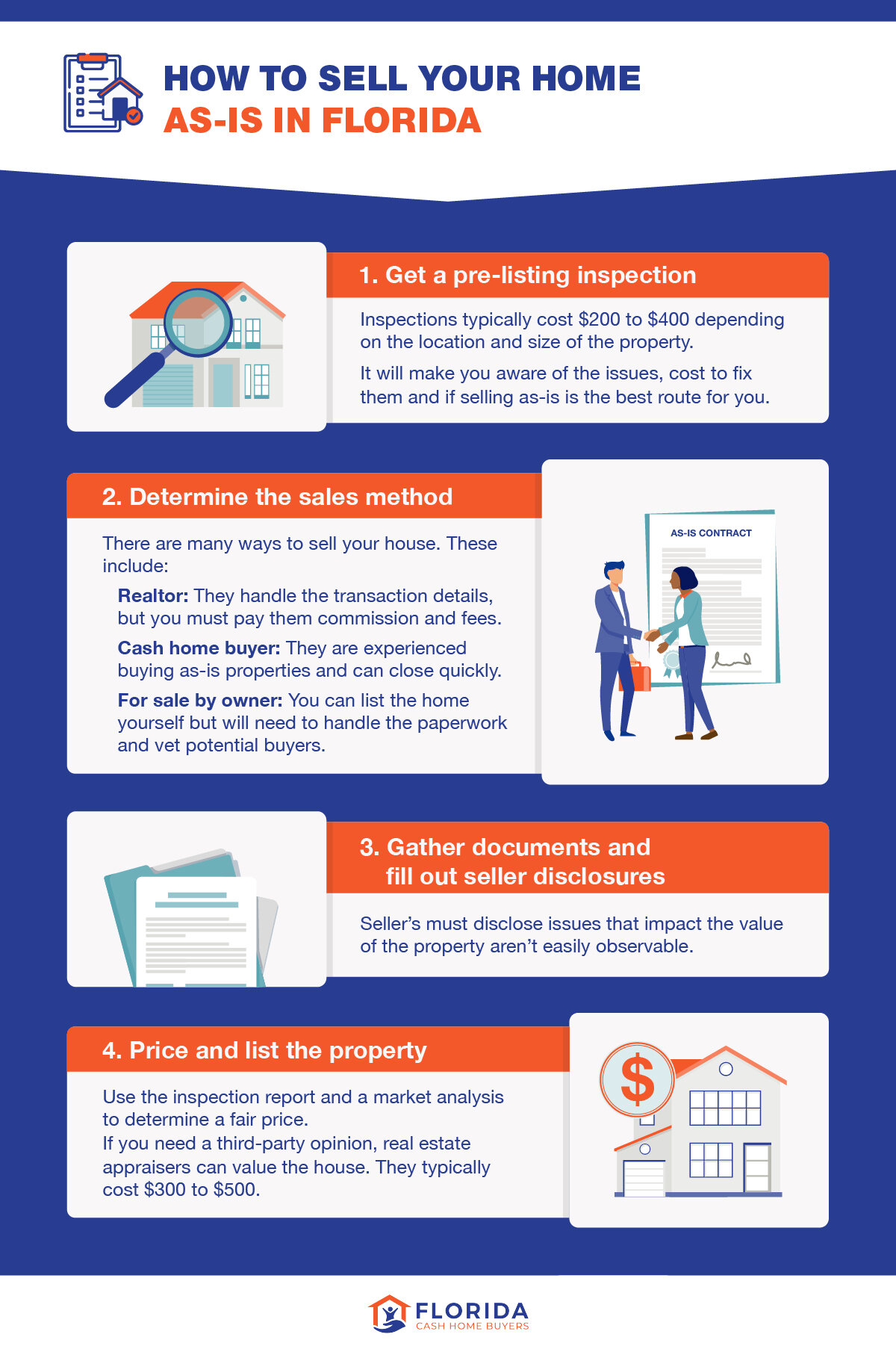
3. Gather Documents and Fill Out Seller Disclosures
Paperwork is a big part of home sales, and it’s very important to ensure you have all the details lined up. The documents you need will both prove your right and ability to sell the house, as well as identify the property to be sold and the rights associated with it. These include:
- Proof of identity
- Deed
- Original Purchase and Sale Agreement
- Mortgage statement
- Property and maintenance history
- Preliminary home title search
You’ll also need to fill out a seller disclosure form covering the defects we outline below, like material damage and environmental hazards. If you’re working with a professional, they can help you fill out forms, gather documents and make sure everything is in order.
4. Price and List the Property
If you’re selling the property yourself, you can use the pre-inspection report and a market analysis to price the property. You can also hire a real estate appraiser to get a third-party opinion, which usually costs around $300 to $500 depending on the location and property size. It’s best to get price opinions for both the property as-is and how much it might sell for once repaired.
Real estate listing agents often offer a comparable market analysis (CMA) for free as part of their strategy to entice you to list the property with them. Although it can be a great tool, remember that they may be tempted to give you a higher number to raise your hopes up.
If you’re selling with a cash home buyer like us, you can skip this step. We’ll come up with a fair offer. All you have to do is call us or submit a request online.
Can You Sell a House As-Is Without the Buyer Inspecting It?
Paragraph 12 in the as-is contract gives the buyer a standard 15-day inspection period unless otherwise adjusted. The buyer could waive the expectation contingency if they don’t think it’s worthwhile, which they might if they’re planning to gut the house or tear it down. But many buyers exercise this right in case they find major issues with the property.
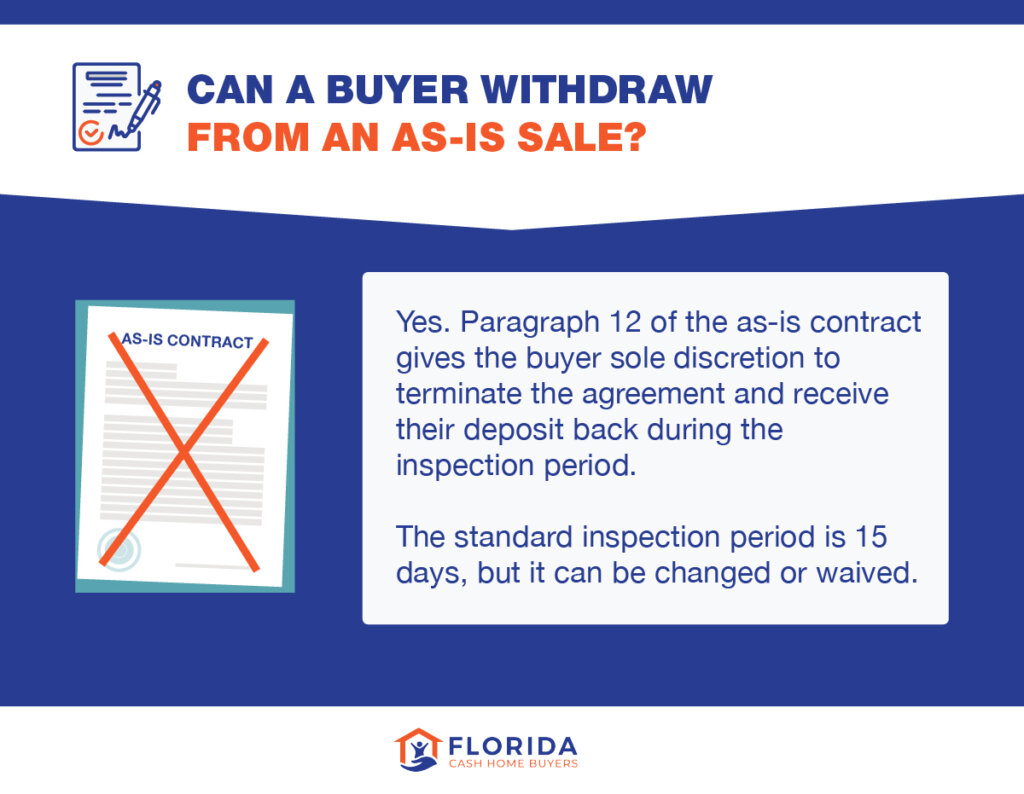
Can Buyers Back Out of an As-Is Contract?
Yes, buyers may back out of an as-is contract during the inspection period for any reason. Paragraph 12 of the contract stipulates that the option to terminate resides in the buyer’s “sole discretion.”
If the buyer independently decides that the property doesn’t meet their expectations or requirements, they can cancel the contract. Cancellations have to be communicated to the seller through written notice before the inspection period ends. As long as the buyer does this, their deposit gets reimbursed, and the buyer and seller will be released from their obligations.
If the inspection period is over, it’s more difficult for the buyer to back out of the contract. If they still choose to back out, they may face fees and penalties.
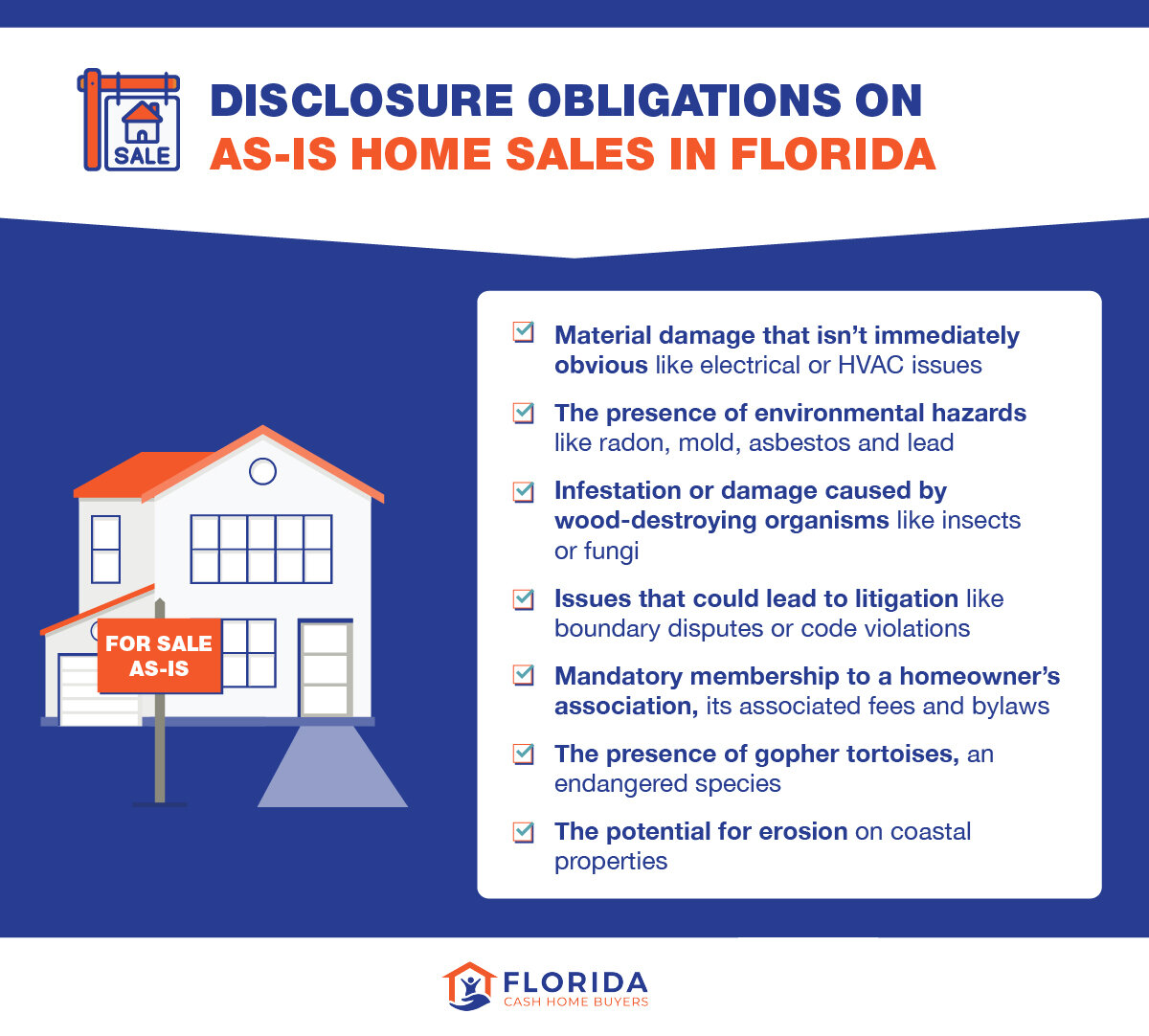
What Do You Have to Disclose When Selling As-Is?
Florida is a “duty to disclose” state. This means the home seller has to inform the buyer of any defect on the property that could put occupants in danger, like health hazards from mold or asbestos, or that could materially change the property’s value, like the presence of a dumpsite in the neighborhood.
Florida provides a set of disclosure forms every homeowner must complete honestly. You aren’t allowed to misrepresent the condition of the property by disguising damages either. If the buyers find out that you’ve been dishonest at any point in the process, they’re entitled to sue even after taking possession of the building.
You can read more about disclosure requirements in paragraph 10 of the as-is contract.
Following the Johnson vs. Davis case, the Florida Supreme Court ruled that “where the seller of a home knows of facts materially affecting the value of the property which are not readily observable and are not known to the buyer, the seller is under a duty to disclose them to the buyer.”
Even so, it’s still the buyers’ responsibility to have the property inspected before purchasing it. If the sellers are unaware of any issues — which could happen if they’ve never lived on the property, for example — they cannot be held responsible for disclosing them.
On the other hand, if the buyers can prove that the sellers chose to conceal known issues, they may sue them even after closing the property.
In addition to the examples above, here’s a general overview of what sellers have to disclose:
Any material damage in the property or any essential components (electric system, plumbing, HVAC, etc.) that may not be immediately obvious to the buyer or home inspector. For example, a crack in the foundation that leaks in case of heavy rain.
The presence of environmental hazards on the property that could affect the occupants’ physical, mental, and social well-being, such as mold, asbestos, radon and lead (for houses built before 1978).
Any infestation or damage caused by wood-destroying organisms such as insects (including termites and ants) or fungi.
Any issues that could lead to litigation, such as any dispute about property boundaries, code enforcement violations (an illegal addition, for example) or problems with the property title.
Any mandatory membership to a condominium or homeowner’s association. The property seller must disclose the bylaws, fees and restrictions. Failure to do so could lead to the sale being voided.
If gopher tortoises – an endangered species – are nesting on the property. According to state law, it is illegal to harm, capture or transport gopher tortoises or damage their burrows, except as authorized by specific Florida Fish and Wildlife Conservation Commission (FWC) permit.
Coastal property owners must inform buyers of the potential for erosion and whether or not the property might be subject to regulations regarding construction, rigid coastal protection structures and beach nourishment. The presence of sinkholes, past or current, must also be disclosed.
House sellers in Florida can easily find disclosure forms online. There are no legal obligations for them to use the official Florida Association of Realtors form. In fact, disclosing any issues verbally to the sellers discharges you of your legal obligations. However, in case of any problems down the road, it’s best to get everything clearly in writing. Being proactive will protect you in case of litigation.
What Don’t You Have to Disclose When Selling As-Is?
Though many issues must be disclosed, you’re not obligated to tell buyers everything about your home’s history. Certain things aren’t covered by disclosure laws, including:
- Cosmetic issues, such as peeling wallpaper or damaged drywall, that are readily observable by the buyer.
- A death, suicide, or homicide that occurred on the property.
- Your home’s flood history. It’s considered the buyers’ responsibility to do their due diligence.
Should You Sell Your Florida Home As-Is?
Like any property-moving strategy, there are pros and cons to selling as-is. If you need to sell quickly, need cash fast, or don’t have the time and money for costly repairs, it may be a good option. But if the property is in good shape, selling as-is may not be the best option for you.
| Pros | Cons |
|---|---|
| You don’t have to spend money & time on making repairs. | The pool of potential buyers is smaller if the property is in bad shape. |
| You can sell the home quickly and save money on holding costs such as a mortgage, insurance, taxes, HOA, etc. | You will most likely end up selling to an investor who typically pays less than a retail buyer. |
| A quick sale gives you faster access to cash than a standard sale which may have a longer closing time. | Selling “as is” may have a bad reputation. Some buyers may think you are trying to hide issues with the property. |
| You don’t have to deal with the headache of managing contractors and handymen. | Buyers have a strong right of cancellation and can walk away with their deposit during the inspection period. |
| Investors love buying properties “as is” so that they can fix them up and resell for a profit. | If there aren’t many investors in your area, the house may take a long time to sell. |
Pros of Selling As-Is
- Avoid repair negotiations after the home is inspected. Selling as-is means that you’re not responsible for the cost of repairs. The buyer is responsible for any repairs that need to be made.
- Close on the property quickly. Repairing damages often takes time and money. During this time, you may be paying holding costs like mortgage, insurance, tax and HOA fees. When you sell as-is, it’s usually easy to find investors that will fix up the property themselves and resell it. This avoids the stress and hassle of making intensive repairs.
- Access cash fast. By selling your house as-is in Florida, you can close quickly and use the proceeds to purchase another property, pay off your debts or settle any litigations such as a divorce or an inheritance.
- No need to acquire funding for home improvements: Proceeding to make necessary repairs or cosmetic improvements can be extremely expensive, especially if the house suffers from considerable damages such as water or fire or if maintenance has been deferred for some time. It can be difficult to afford these repairs, and funding them through loans means that you’ll need to pay interest and fees.
- Avoid issues with the buyer’s financing falling through. Properties listed as-is typically appeal primarily to cash buyers and investors. Regular home hunters usually need to obtain a mortgage and must often deal with financing-related delays. In some cases, the deal may fall through at the last minute if there are any issues during the loan process
What Do You Have To Lose? Get Started Now…
Cons of Selling As-Is
- There is a smaller pool of potential buyers. Typical home buyers may not have financing options as lenders typically don’t finance properties in poor condition. The vast majority of interested parties will be cash buyers and real estate investors.
- The house will sell below market value. An as-is listing may need to be priced below market value to appeal to buyers and compete with similar properties since likely purchasers are interested in potential returns on investments. They will still need to add the costs of repairs to bring it up to livable condition to rent it or sell it for a profit.
- Selling as-is has a bad reputation. Buyers may deem an as-is sale too risky, especially if the property appears in disrepair.
- Buyers can walk away during the inspection period. The buyers have a lot of power up until the end of the inspection period. If they walk away, you’ll need to start the process over again.
- The house may be on the market for a long time. While investors and cash buyers like us are happy to buy as-is properties, some markets aren’t investor-friendly or the condition of properties may not yield a favorable return.
When Should You Fix Up Your Home Instead of Selling As-Is?
Selling as-is is great if you want to sell your house fast or the property needs extreme repairs. However, there are certain scenarios where it might make sense to fix up your home so that it’s closer to move-in ready.
If the repairs are minimal and cosmetic for the most part, it may be in your best interest to improve your property’s condition before putting it on the market. You’ll attract a bigger pool of prospective buyers, and you can probably recoup the cost of your investment by setting a higher price in the sale of the house, especially if you’re willing to do some or most of the repairs yourself.
And if you don’t want to fix the house before listing it, you can cut down your asking price or offer concessions to potential buyers to go toward resolving some of the most prominent issues, such as changing damaged carpets.
How Much Will We Offer You for Selling Your Home As-Is?
At Florida Cash Home Buyers, we’ll make you a fair cash offer with no obligation to accept. We calculate our offer by subtracting the cost of renovations, our holding and selling costs, and our minimum required profit from the After Repair Value (ARV) of the property. Holding and selling costs are about 10% and our minimum required profit is 10%.
Say the ARV of your property is $300,000 and repairs will cost us $40,000. We’d calculate our offer like this: ($300,000 x 80%) – $40,000 = $200,000 cash offer.
Get a Quote for Your Florida Home Today!
Experienced cash buyers like us are equipped to buy property a lot faster than the typical selling process. It could be months between the moment you list your house as-is and when you finally hand over the keys, especially if your property isn’t in the best shape.
Skip the potential risks of unqualified buyers, lowball offers or deals that fall through. We’ll offer you a fair price for your fixer-upper and can close in as little as a few weeks. Contact us today for a quote.
Most Visited Pages
Click below to go to the page
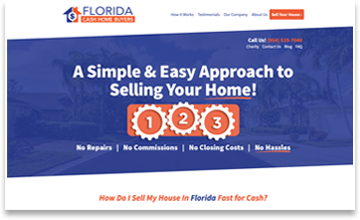
How It Works
Ever wondered how this whole “we buy houses cash” process works? Here’s where we share all the details!

Testimonials
Ever wondered how this whole “we buy houses cash” process works? Here’s where we share all the details!


